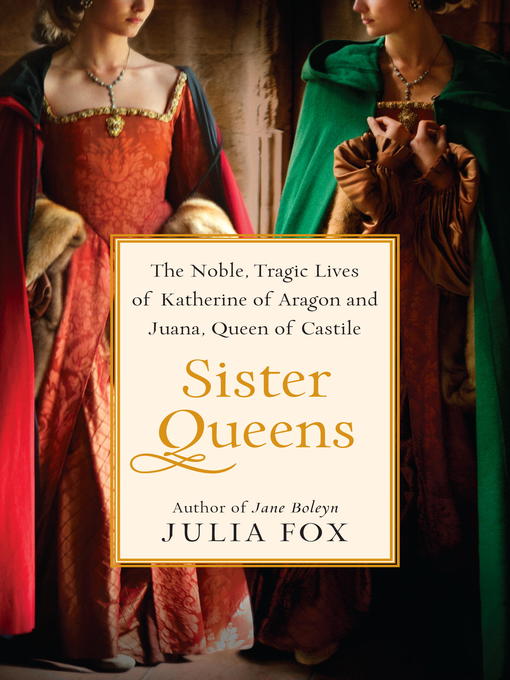
Sister Queens
The Noble, Tragic Lives of Katherine of Aragon and Juana, Queen of Castile
کتاب های مرتبط
- اطلاعات
- نقد و بررسی
- دیدگاه کاربران
نقد و بررسی

October 31, 2011
Daughters of Spain’s Isabella and Ferdinand, the sister queens Katherine of England and Juana of Castile epitomized the pitfalls of being “born female in a male-dominated society.” Although Juana became queen of Castile after Isabella’s death, her closest male kin, beginning with her bullying husband, Philip of Burgundy, usurped her throne by circulating rumors that the temperamental queen was deranged; then her father, and then her son, kept her as an abused prisoner. But Juana bore healthy sons and her descendants dominated Europe for some two centuries after her death. The politically astute Katherine was Henry VIII’s closest adviser in their marriage’s early days and enjoyed a productive, contented life. But she lost Henry’s affection and her title as queen consort when she failed to produce a male heir. If Fox’s (Jane Boleyn: The True Story of the Infamous Lady Rochford) recreation of the characters’ interior worlds feels contrived and her downplaying of Katherine’s self-righteousness and Isabella’s brutal religious fanaticism are questionable, the author offers an absorbing, rich, and fresh view of the entwined royal relationships that helped define the 15th- and 16th-century European political landscape. 16 pages of color photos; 1 map.

November 1, 2011
An initially inspired juxtaposition of the lives of the two Spanish sister queens grows saccharine in the hands of British historical researcher Fox (Jane Boleyn, 2007). The daughters of Queen Isabella of Castile and King Ferdinand of Aragon were positioned at a very young age to marry the most illustrious monarchs of Europe and inherit enormous power in their own right. Yet both were outmaneuvered by the men around them--father, husbands, son--and both eventually squandered and lost their power, dying in shame and isolation. Fox fashions a sympathetic, storybook narrative of the two sisters, daughters of strong monarchs, especially their mother, who spearheaded the Reconquista of 1492. The girls were educated in Latin and married off in their mid-teens, Juana to Philip of Burgundy, and Katherine to Arthur, Henry VII of England's eldest son. Fate intervened swiftly and changed the course of history: A series of deaths of her older siblings left Juana in the position of inheriting her parents' kingdom, while her new husband began systematically to rob her of her authority, casting doubt about her sanity; in England, Arthur's death left Katherine vulnerable until finally she was wedded by his brother Henry VIII and made queen--temporarily. Juana, for her part, despite her sovereignty and the many children she would bear her husband, was essentially disinherited from and then imprisoned first by her father, Ferdinand, then her own son, Carlos V, for the remaining 46 years of her life. Was she truly mad or deliberately enfeebled in the power struggle? Her sister Katherine, more politically astute, had acted as Henry VIII's equal, until her inability to provide a male heir prompted him to divorce her and she was forced to acquiesce. Fox takes the side of the ill-fated sisters, but she does not offer any new light through the murky historical record. A sad tale drawn out and viewed through rose-colored glasses.
(COPYRIGHT (2011) KIRKUS REVIEWS/NIELSEN BUSINESS MEDIA, INC. ALL RIGHTS RESERVED.)

September 1, 2011
Katherine of Aragon was rudely shoved aside by husband Henry VIII in favor of Anne Boleyn, while sister Juana, wife of Philip of Burgundy and mother of the Holy Roman Emperor Charles V, remained so besotted with her husband even after his early death (she refused to bury his coffin) that she was eventually confined by her family. Fox won great attention with Jane Boleyn: The True Story of the Infamous Lady Rochford; for all Anglophiles.
Copyright 2011 Library Journal, LLC Used with permission.

December 1, 2011
Katherine of Aragon, the Spanish wife whom Henry VIII divorced with monumental consequences for English history, had an elder sister, Juana, who was politically significant as heir to the throne of Castile. In this parallel biography of the siblings, Fox contrasts their lives as circumscribed by powerful princes, showing how their personalities responded to adversity. Those remembering that Juana's moniker is the Mad know that Fox has a reclamation project ahead of her, which she founds on the fact that Juana's father, King Ferdinand of Aragon, and her son, Emperor Charles V, imprisoned her in a castle. Casting her reported behavior of outbursts, sulking, and self-starvation as protest against imprisonment, Fox successfully provokes sympathy for Juana. Katherine is, of course, more famous, dramatic, and controversial. Was her first marriage, to Henry's older brother, Prince Arthur, truly unconsummated? Katherine proved a doughty and savvy antagonist of Henry, her formidable character demurely veiled behind piety in Fox's fluid and pellucid narrative. A talented entrant in royal biography, Fox fairly bids for the popularity historian Alison Weir presently wields.(Reprinted with permission of Booklist, copyright 2011, American Library Association.)

























دیدگاه کاربران